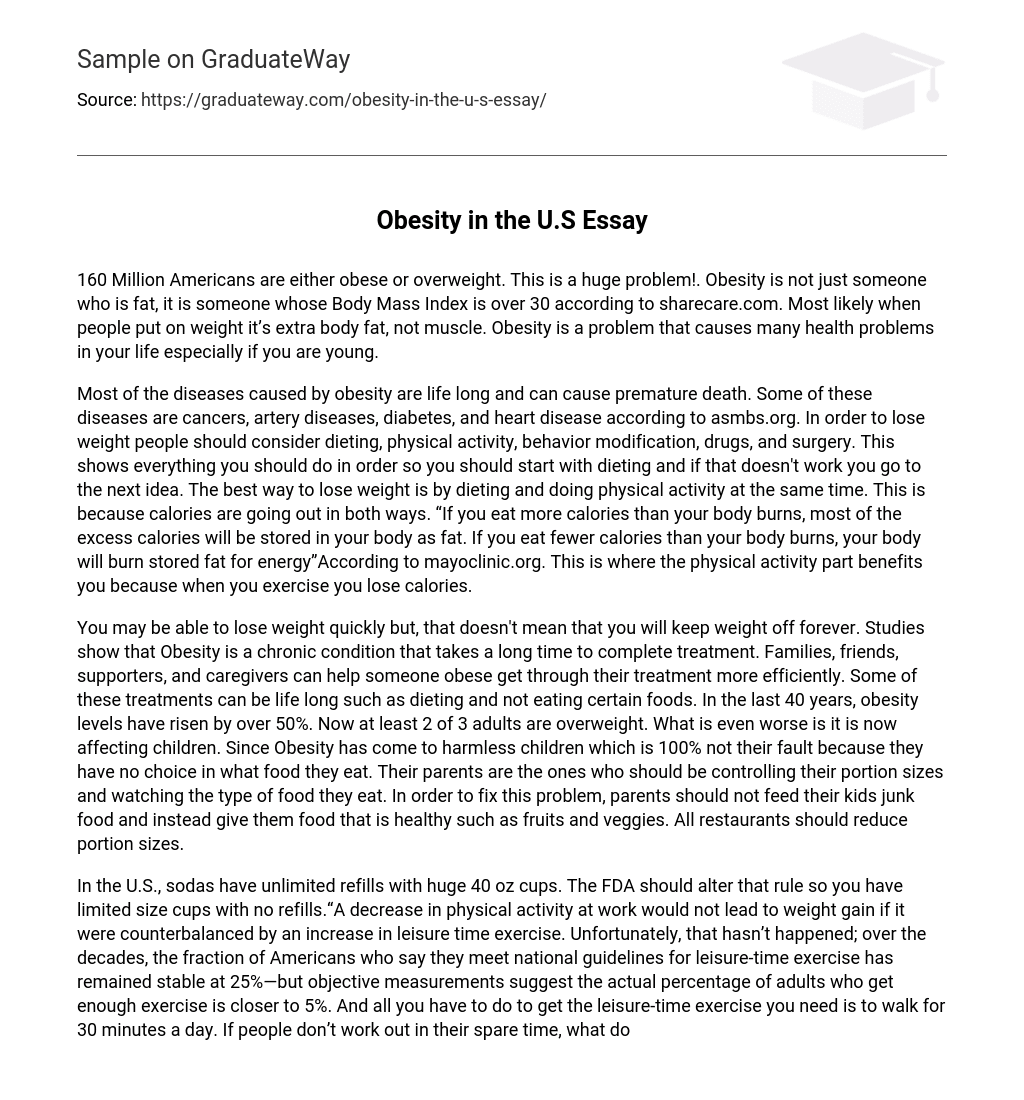160 Million Americans are either obese or overweight. This is a huge problem!. Obesity is not just someone who is fat, it is someone whose Body Mass Index is over 30 according to sharecare.com. Most likely when people put on weight it’s extra body fat, not muscle. Obesity is a problem that causes many health problems in your life especially if you are young.
Most of the diseases caused by obesity are life long and can cause premature death. Some of these diseases are cancers, artery diseases, diabetes, and heart disease according to asmbs.org. In order to lose weight people should consider dieting, physical activity, behavior modification, drugs, and surgery. This shows everything you should do in order so you should start with dieting and if that doesn’t work you go to the next idea. The best way to lose weight is by dieting and doing physical activity at the same time. This is because calories are going out in both ways. “If you eat more calories than your body burns, most of the excess calories will be stored in your body as fat. If you eat fewer calories than your body burns, your body will burn stored fat for energy”According to mayoclinic.org. This is where the physical activity part benefits you because when you exercise you lose calories.
You may be able to lose weight quickly but, that doesn’t mean that you will keep weight off forever. Studies show that Obesity is a chronic condition that takes a long time to complete treatment. Families, friends, supporters, and caregivers can help someone obese get through their treatment more efficiently. Some of these treatments can be life long such as dieting and not eating certain foods. In the last 40 years, obesity levels have risen by over 50%. Now at least 2 of 3 adults are overweight. What is even worse is it is now affecting children. Since Obesity has come to harmless children which is 100% not their fault because they have no choice in what food they eat. Their parents are the ones who should be controlling their portion sizes and watching the type of food they eat. In order to fix this problem, parents should not feed their kids junk food and instead give them food that is healthy such as fruits and veggies. All restaurants should reduce portion sizes.
In the U.S., sodas have unlimited refills with huge 40 oz cups. The FDA should alter that rule so you have limited size cups with no refills.“A decrease in physical activity at work would not lead to weight gain if it were counterbalanced by an increase in leisure time exercise. Unfortunately, that hasn’t happened; over the decades, the fraction of Americans who say they meet national guidelines for leisure-time exercise has remained stable at 25%—but objective measurements suggest the actual percentage of adults who get enough exercise is closer to 5%. And all you have to do to get the leisure-time exercise you need is to walk for 30 minutes a day. If people don’t work out in their spare time, what do they do? They sit still; the average American, in fact, spends 55% of his waking hours sitting down. And when Americans sit, they are often perched in front of a video display, either a workplace computer or a living room TV. Sedentary work is an inevitable byproduct of the Information Age, but TV watching is voluntary and optional—and it often involves watching seductive ads for junk foods just when snacks are close at hand. An American Cancer Society (ACS) study of 123,216 adults with an average age of 63 found that sitting can be hazardous to your health.
The scientists reported that the death rate of men who spent the most time sitting was 17% higher than that of their peers who spent the least time sitting. Most of the excess deaths linked to sitting were caused by cardiovascular disease, and the results held up even after the researchers took other cardiovascular risk factors into account. The ACS study excluded sitting at work but evaluated all other time spent sitting, including reading, attending meetings and events, socializing, and watching TV. A 2011 European study that focused specifically on TV watching reported similar results. A total of 12,608 men and women with an average age of 61 volunteered for the research. At the start of the study, all the participants provided detailed information about their medical histories, medications, and health habits, including diet, smoking.





